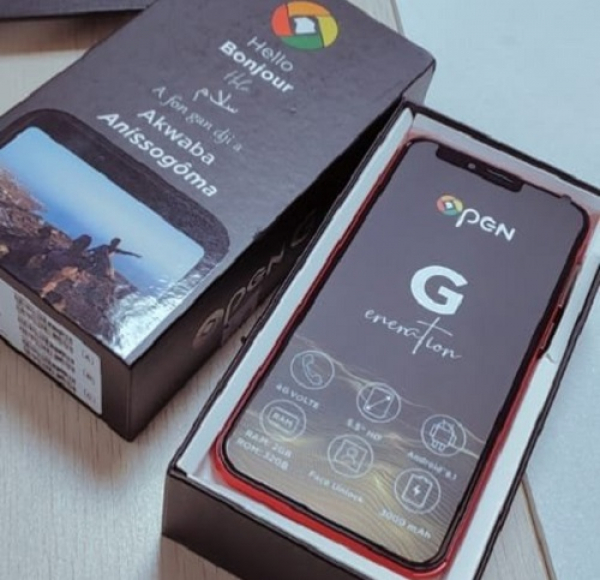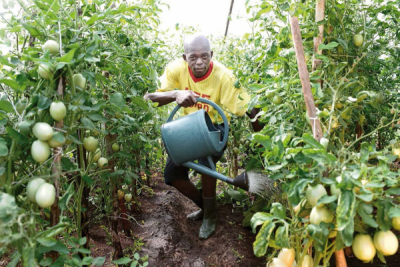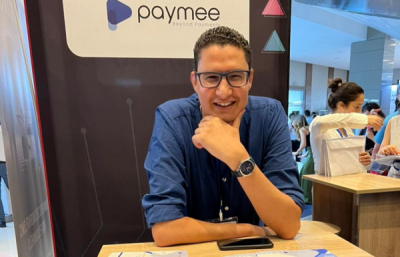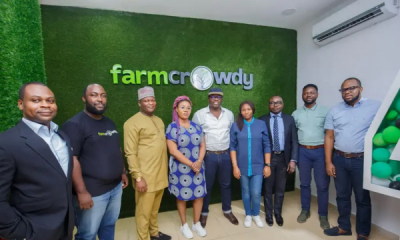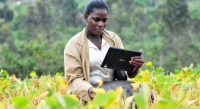
Solutions (581)
Africa is trying to pick up on the ongoing tech revolution. Its entrepreneurs are developing tech tools to address local problems or improve the existing solutions. In that line, a Beninese entrepreneur -settled in Côte d’Ivoire- recently launched a superphone speaking dozens of African languages.
On July 9, 2022, tech group Groupe Cerco launched a superphone that can be used by illiterate people thanks to its voice assistant, KONE. Apart from the usual languages (French, English, etc), KONE can speak some fifty African languages.
“Open [the superphone] has a smart voice assistance that speaks more than 50 African languages and allows personalized voice commands and searches in Dioula, Baoule, Fon, Goun, Yoruba, Wolof, Swahili, Peul, Malinké, Bambara, Hausa…,” said Dr.Alain Capo Chichi, CEO of Groupe Cerco.
The superphone was manufactured by Ivorian engineers inside the ICT village Vitib in Grand-Bassam, Côte d’Ivoire. It comes with two gigabytes of RAM and 32 gigabytes of ROM as well as a free 16 gigabytes memory card. Orange, which is Groupe Cerco’s official partner since the launch of Open superphone, offers a free 7.5 gigabytes data bundle to every buyer.
With Open, Alain Capo Chichi wants to conquer the world, starting from Africa (Côte d’Ivoire, for the time being). By 2023, he expects KONE will understand more than 1,000 languages, covering every local dialect in Africa.
Currently, the superphones are available in Orange Côte d’Ivoire’s stores at a promotional price of XOF60,000 (normal price: XOF100,000).
Adoni Conrad Quenum
Its prototype was a low-cost solution developed to test the viability of the founder’s idea. Once corrected and refined, the solution is now accessible in five countries, helping thousands of users.
Lisungui Pharma is a digital platform developed by a Congolese startup founded in 2015. The health tech platform geolocalizes pharmacies located within a 10-kilometer radius from the user. It also helps determine drug availability and prices and acts as a medication reminder.
To develop the prototype of the digital platform, the Congolese startup contracted Indian developers, to check whether the idea could be embodied in an app, indicated its founder, Rufin Ovoula Lepembe.
“Due to its low-cost design, the prototype had several bugs but, it proved that the concept was valid and needed just refinements,” he added.
The platform is operational in Burkina Faso, Côte d’Ivoire, Senegal, Cameroon, and Congo. It is accessible only via an Android app. To use its features, users must register an account and enable geolocation.
Apart from showing the pharmacies accessible in the neighborhood, the platform also gives directions from the users’ location to the selected drugstore. In 2016, it earned its founder the first prize in the business competition organized by the Congolese foundation Perspectives d'Avenir. Two years later, the founder became one of the winners of the Tony Elumelu Foundation program. Rufin Ovoula Lepembe hopes his solution will be available in at least 20 countries in the coming years.
Adoni Conrad Quenum
The tech solution networks farmers, agronomists, and buyers to allow access to agricultural advisory and improve producers’ income.
Wagui is a digital app developed by a Gabonese eponymous startup, founded in 2018, by Marlyse Mapaga and Tamarah Moutotekema Boussamba. It offers useful recommendations to help farmers improve their production and income.
“By creating Wagui, I wanted to address the networking problems faced by farmers and producers but also improve their revenues. My aim was also to facilitate access to the agricultural advisory. Wagui can be improved thanks to users’ feedback. Our challenge is to include everyone into the value chains,” indicates Tamarah Moutotekema Boussamba.
Wagui networks farmers, buyers, and agronomists. It was born from the experience of one of its team’s relative who was able to pinpoint the problems faced in the agricultural sector. Currently, it is accessible via an Android app only.
In 2018, Wagui received the second prize for the best technology solution at the Africa Code Hackathon competition held in Egypt. The following year, it joined the Gabon Digital Incubation Company, a public company whose ambition is to boost “African companies’ competitiveness through digital transformation.”
Adoni Conrad Quenum
Mobile money and digital payment solutions are gradually taking over the business world. To facilitate payment processing, entrepreneurs are developing efficient solutions.
Paymee is a fintech solution developed by a Tunisian eponymous startup. It is a gateway allowing firms to collect card payments.
According to Paymee founder Mawen Amamou (photo), the startup is already known for the simplicity and efficiency of its payment solutions. It now wants “to become the market reference in Tunisia … addressing [..] client needs and simplifying their operations …,” he said in a recent release announcing the completion of a “six-figure round.”
To integrate Paymee’s solution on their websites, firms just have to create a business account with the fintech startup and validate that account by submitting required documents. They can also use the startup’s application programming interface or plugins. No matter the integration method chosen, they can process their transactions in real-time.
In May 2019, the Tunisian Ministry of the digital economy labeled Paymee, which was founded in 2017, as a “startup”. Currently, it claims over 15,000 agent accounts and more than 250 business accounts with some 100,000 transactions processed.
Adoni Conrad Quenum
Farmcrowdy Foods Limited launched the digital platform amid the coronavirus pandemic as a way to curb a potential food shortage.
Farmcrowdy Foods is a digital platform launched in April 2020 by Nigerian startup Farmcrowdy Limited. It helps users easily purchase fresh farm products and groceries.
According to Farmcrowdy Foods’ business lead, the digital platform completes the local production’s value chain. “What we sell is what we get from the aggregation centers. On Farmcrowdy Foods, our products are classified into grains, tubers, seafood, wheat, and fruits and veggies. Save for our seafood where we’ve partnered with credible importers and farmers who produce things like snails and prawns locally, every other thing we have on our platform is gotten from our aggregation centers,” she added during an interview with Techpoint Africa.
Right from its launch, the solution became popular and, in its first 90 days, it recorded 3,000 orders just through its Android app. The only challenge it faced was logistics since there were Lagos areas “where cars and bikes cannot ply without suffering some kind of damage,” Linda says.
To access the platform’s contents and information, users must have an account or create one. To support its growth, the startup -founded in 2016 by Onyeka Akumah, Akindele Phillips, Temitope Omotolani, Christopher Abiodun, and Ifeanyi Anazodo - completed several funding rounds totaling US$3.4 million. In late 2020, it revealed that it had already raised US$15 million to finance 25,000 farmers.
Adoni Conrad Quenum
The coronavirus pandemic turned lives upside down everywhere, forcing habit change in almost every sector. It also accelerated digitalization and innovation, with local entrepreneurs developing solutions to address their compatriots’ pain points.
OnilBox is a Tanzanian startup that helps users find nearby training studios, gyms, etc, and book fitness activities and events. It was launched by Natalino Mwenda, in 2021, during the coronavirus pandemic to help fitness enthusiasts find gyms and similar facilities to work out in uncrowded locations.
“The concept originated amid COVID-19 from a garage CrossFit gym that users wanted to access to escape crowds. Users called to make bookings and as the calls continued to increase, OnilBox built an app that allowed users to book a room instead of calling. One room expanded to four, gyms joined the network, and activities also joined the network, allowing OnilBox to offer the largest fitness experience in Tanzania and Zanzibar,” Natalino told Disrupt Africa.
Through its Android and iOS apps, users can search available locations and activities to book their sessions. They can filter the desired results by the number of people and desired session duration. To diversify its offer, the startup introduced smart gyms powered by IoT.
Unlike traditional gyms that require monthly subscriptions, OnilBox operates a Pay-as-You-Go model. Its timer counts down the session duration and even unregistered users can use its services. Currently, the startup claims over 100 users and 2,000 workout sessions and locations booked. It plans to expand to other countries including Kenya, Mauritius, South Africa, and Rwanda.
Adoni Conrad Quenum
In the music business, streaming has gradually taken precedence over music downloading. In Benin, a local startup wants to promote local audio content producers via that method.
DingaStream is a digital streaming platform developed by a Beninese eponymous platform. The platform, unveiled to the public in August 2021, allows users to listen to pan-African music. Its stated ambition is to showcase local audio content creators and let them monetize their productions.
“I made an ideological choice to create a product meeting the For Us by Us principle. For that purpose, I decided to recruit an African workforce, work in Africa, and produce for the African public with a focus on the Beninese audience because I have my roots and my activities there. Nevertheless, we are focused on Africa,” explains DingaStream founder Miguel Kpakpo.
For the time being, DingaStream is accessible through its web platform and Android app. To access its streaming services, users must first register and buy a monthly or quarterly subscription. A monthly subscription costs XOF2,000 (about US$3.11) against XOF5,000 for a quarterly subscription, payable via bank cards or mobile money. Artists are paid XOF3 per play.
Besides music streaming, DingaStream allows exclusive previews, podcast streaming, and offline listening.
Adoni Conrad Quenum
Artificial intelligence helps address numerous economic challenges. In the agriculture sector, which is the main source of employment and livelihood in developing countries, it contributes to the improvement of agritech solutions.
Agrix Tech is a digital platform developed by the eponymous Cameroonian agritech startup. The app helps small farmers efficiently treat plant diseases, control weeds, and fight crop pests thanks to artificial intelligence.
According to Agrix Tech founder Adamou Nchange Kouotou, “in developing countries, most small farmers are self-taught with no proper skills in the management of crop diseases and pests.”
Hence the development of Agrix Tech. The platform has an Android app that allows farmers to register for its services. To get plant disease management recommendations, farmers scan the affected plants using the Agrix Tech app and let the startup automatically analyze the video collected and send adequate recommendations.
The platform can also help farmers determine the best crops for a said soil, the best farm maintenance techniques, and best practices. To allow farmers with low literacy, or even illiterates, to access its services, the app integrates speech and text recognition technology that can identify several local languages.
The startup offers its services to small farmers for free. But, to generate revenues for its operations, it sells ad spaces and user licenses to agriculture consulting firms.
Adoni Conrad Quenum
In major African cities, it is difficult to find rental offices and houses meeting the desired options. To address that issue, a Ghanaian startup developed a platform catering to the local real estate market.
MeQasa is a digital real estate marketplace developed by a Ghanaian eponymous startup founded in 2013. It allows users to buy or rent real estate properties meeting their needs within a reasonable period.
In 2015, the Ghanaian startup raised US$500,000 to support its growth. MeQasa “ has a strong platform in place and is quickly progressing in what we see as a truly dynamic market in West Africa. The combination of our own online classifieds experience across emerging markets, along with meQasa’s passion and commitment, makes for a powerful combination and opportunity to build an industry-leading business in Ghana and beyond,” said Shaun Di Gregrio, CEO of Frontier Digital Ventures which invested at the time.
For a stronger impact, MeQasa developed mobile apps (available on Playstore and AppStore). It allows users to filter real estate properties all over Ghana, from Accra to Osu. The user can also filter properties by price, property type, etc. When results are displayed, users can click on selected properties to get all the information required to proceed further. The digital marketplace also has a blog discussing proptech-related subjects.
Adoni Conrad Quenum
Currently, in Africa, some SMEs still use inefficient expense management tools. In South Africa, Sava Africa wants to change that by introducing automated accounting tools.
Sava, also Known as Sava Africa, is a digital platform developed by South African startup SAVA Technologies Inc. It offers automated accounting tools that allow SMEs to improve expenditure management.
SAVA Technologies Inc. was founded, in 2021, by Yoeal Haile, Federico Von Bary Landesmann, and Kolawole Olajide. According to Kolawole Olajide, Sava “will help business owners manage their finances and solve some of the pain points they’ve faced from using disjointed financial software tools.”
For the time being, the platform has no mobile app. It is in its pre-launch phase and to access its features, notably virtual card issuance and budget/cash flow management, users currently have to join its waitlist. The fintech also offers quick credits with flexible repayment plans. Recently, it completed a US$2 million pre-seed round to develop new products. It plans to officially launch operations in South Africa in the third quarter of this year and enter the Kenyan and Nigerian markets later.
Adoni Conrad Quenum
More...
In Africa, startups offer a wide range of services and solutions to address the population’s needs. Movemeback wants to connect talented diaspora members to “high potential opportunities” in Africa.
Movemeback is a digital platform developed by UK incorporated company Movemeback Ltd. It connects members (namely leaders, influencers, and top talents) to high-impact social and entrepreneurial career opportunities.
For the time being, the platform has no mobile app. To join, users will have to visit its website, submit an application and wait for approval (subject to screening). Movemeback wants “to drive positive economic and social growth in Africa by providing an internationally trusted platform through which individuals, organizations and institutions across the world interact and partner with Africa.” For that purpose, it focuses notably on facilitating collaboration between its members.
Africa “has so much diversity, unmet and undiscovered need but even more interestingly untapped and uninitiated talent. The story is colorful, it’s multifaceted and through the process of the crowd, we intend to share it in high definition,” it explains.
In August 2020, Movemeback Ltd (incorporated in 2014), was among the 11 African startups to participate in “The Future is Female” mentorship program.
Adoni Conrad Quenum
In the Ivorian language Bambara, Julaya means “trade”. It is now the name of a startup that facilitates payments. Currently, it claims hundreds of users in some regions.
Julaya is a digital platform developed by Franco-Ivorian startup Julaya SAS, founded in 2018, by Charles Talbot and Mathias Léopoldie. It allows users to make payments to mobile money and bank accounts right from one single platform.
The platform “allows our clients to facilitate their accounting. They, therefore, improve their operating efficiency by automating staff, daily expenditure, and supplier payments. Our solution is plug-and-play with no tech skill requirement. It can thus be used by financial departments, which are still poorly digitalized,” explains co-founderMathias Léopoldie.
Through its Android app, payments can be sent in record time. However, users will have to create a Julaya account and load it via partner banks, telecom operators, and fintech to access the feature. In Côte d’Ivoire and Senegal, Julaya accounts can be loaded via at least 10 banks.
According to Julaya SAS, over 300 directors of financial affairs and managing directors use the solution daily. In addition, the solution has processed more than 100,000 payments and salaries, helping save more than 300 hours of waiting time. The startup claims to have customer service available every hour of the day.
Currently, its fees vary between 0 and 2 percent per transaction depending on the transaction type. Since its creation, the startup has completed several funding rounds totaling US$2.7 million, from angel investors and venture capitals like Orange Ventures, to support growth.
Adoni Conrad Quenum
The startup claims over 15,000 farmers supported in Mali and Uganda. Its ambition is to expand further in the African market, starting from Côte d’Ivoire.
OKO is a digital platform developed by Malian startup OKO Finance Limited, founded in 2018 by Raphael Haziza, Shehzad Lokhandwalla, and Simon Schwall. It helps smallholder farmers access affordable crop insurance.
“OKO is a different type of for-profit business making a global impact one farmer at a time. [...] We provide effective, affordable insurance to farmers in emerging markets and deliver instant claim settlements. By leveraging the increasing influence of mobile technology, we aim to help overcome income distribution insufficiencies for those who feed the world," the startup explains.
Therefore, with just their non-smartphones, users can access OKO crop insurance services. To enable that feature, the startup signed numerous partnerships with Orange Mali, and German financial services multinational Allianz to optimize its products. It assesses the risks and set subscription prices based on detailed weather information.
The platform is accessible via a USSD code, and a mobile app. The mobile app is an alternative to the USSD code. It also has a programming interface that allows partners to access relevant information. It has a set of tools (for reporting, performance tracking, and secured archiving) to improve the management of its various insurance policies.
Thanks to the crop insurance initiative, OKO Finance Limited has received several awards and recognitions. These include the international award at Finance for Tomorrow's Climate Finance Day in November 2019, the FinTech Showcase 2019 award at the Alliance for Financial Inclusion (AFI) Global Policy Forum in Kigali, Rwanda, the Job Creation Award at the Seedstars 2019 Summit organized in Johannesburg by the African Development Bank (AfDB). Since its creation, the startup has completed several rounds totaling US$2.1 million to support its growth. Currently, it is active in Mali and Uganda. It plans to enter the Ivorian market in the next few months.
Adoni Conrad Quenum
Logistics is a real challenge in most African countries. To address those challenges, a Nigerian startup is leveraging technology and micro fleets.
Kobo360 is a digital logistics platform developed by an eponymous Nigerian tech company. It connects truck drivers with freight companies to ensure a quick delivery. The tech company founded in 2017 by Ife Oyedele and Obi Ozor, is active in seven African countries: Nigeria, Ghana, Togo, Uganda, Kenya, Côte d’Ivoire, and Burkina Faso.
According to Wale Ayeni who led IFC’s venture capital investing group in Africa for over five years, “Kobo360 is empowering and enhancing the capacity of the vast underserved network of “micro” fleets in Africa to serve the huge unmet long-haul freight needs of large enterprises and SMEs, delivering value to both sides.”
To fulfill its mission, Kobo360 has developed a mobile app, available on AppStore and PlayStore. The app allows transporters and clients to access all the services it offers once they register. Thanks to its mobile and web platforms, it guarantees clients fast and efficient freight transportation and allows them access to a vast network of warehousing, customs clearance, and freight forwarding partners. It also enables real-time tracking. It allows transporters to boost their revenues above-average rate, expand their trucking business and get discounts for diesel and tire purchases.
The startup currently claims over nine billion kilograms of freight transported, more than 50,000 active trucks, over 150,000 jobs created and some 700 companies served. In 2019, the Africa CEO Forum Awards awarded it the ‘Disrupter of the Year’ award for its quick and significant success in the logistics sector. The same year, its co-founder Obi Ozor was named 'Young Business Leader of the Year' and 'Innovator of the Year'. In 2020, during the AppsAfrica Awards, Kobo360 won the ‘Mobility Award’, outcompeting distinguished African startups operating in the same segment. Since its creation, it has completed several funding rounds totaling US$37.3 million to support its growth.
Adoni Conrad Quenum


